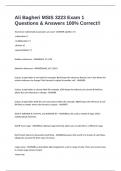Ali Bagheri MSIS 3223 Exam 1
Questions & Answers 100% Correct!!
•Common mathematical operators are used - ANSWER-addition (+)
-subtraction (-)
-multiplication (*)
-division (/)
-exponentiation (^)
Relative references - ANSWERA2, C5, D10
Absolute references - ANSWER$A$2, $C5, D$10
Using a $ sign before a row label (for example, B$4) keeps the reference fixed to row 4 but allows the
column reference to change if the formula is copied to another cell. - ANSWER
Using a $ sign before a column label (for example, $B4) keeps the reference to column B fixed but
allows the row reference to change - ANSWER
Using a $ sign before both the row and column labels (for example, $B$4) keeps the reference to cell
B4 fixed no matter where the formula is copied. - ANSWER
SUM IF, AVERAGE IF, SUM IFS, and AVERAGE IFS - ANSWERcan be used to embed IF logic within
mathematical functions.
SUMIF Sum range - ANSWERan optional argument that allows you to add cells in a different range.
Net Present Value (or discounted cash flow) - ANSWERmeasures the worth of a stream of cash flows,
taking into account the time value of money.
range name - ANSWERis a descriptive label assigned to a cell or range of cells. There are several ways
to create range names in Excel
-Name box
,-Create from Selection
-Define Name
Paste Special - ANSWER•Copy the range of cells of interest and click on the cell where you want to
paste the results. Examples:
-To paste only the values in cells (not the formulas), select Values and then click OK.
-To transpose data in columns to rows and vice versa, use Transpose.
Concatenation - ANSWER•To concatenate means to join. In many applications, you might wish to
take text data that are in different columns and join them together (for example, first and last
names). The Excel function CONCATENATE(text1, text2, . . . , text30) can be used to join up to 30 text
strings into a single string.
-Suppose that cell A1 contains the last name Smith, and cell B1 contains the first name John. Then
CONCATENATE(B1, " ", A1) will result in the text string John Smith.
Error Values - ANSWER•#DIV/0!—A formula is trying to divide by zero.
•#N/A—"Not available," meaning that the formula could not return a result.
•#NAME?—An invalid name is used in a formula.
•#NUM!—An invalid argument is used in a function, such as a negative number in SQRT.
•#REF!—A formula contains an invalid cell reference.
•#VALUE!—Excel cannot compute a function because of an invalid argument.
IFERROR Function - ANSWER•IFERROR(value, value_if_error) displays a specific value if an error is
present.
•For example, if you are computing A1/B1, then if B1 is zero or blank, then
= IFERROR(A1/B1, " ")
will display a blank cell instead of #DIV/0!;
Data analytics - ANSWERare providing benefits to businesses from the beginning of a startup,
facilitating expansive growth, and exploding them into large, formidable companies.
Business Analytics - ANSWERis s the use of:•data,
•information technology,
, •statistical analysis,
•quantitative methods, and
•mathematical or computer-based models to help managers gain improved insight about their
business operations and make better, fact-based decisions.
Pricing - ANSWERsetting prices for consumer and industrial goods, government contracts, and
maintenance contracts
Customer segmentation - ANSWERidentifying and targeting key customer groups in retail, insurance,
and credit card industries
Merchandising - ANSWERdetermining brands to buy, quantities, and allocations
Location - ANSWERfinding the best location for bank branches and ATMs, or where to service
industrial equipment
Supply Chain Design - ANSWERdetermining the best sourcing and transportation options and finding
the best delivery routes
Staffing - ANSWERensuring appropriate staffing levels and capabilities, and hiring the right people
Health care - ANSWERscheduling operating rooms to improve utilization, improving patient flow and
waiting times, purchasing supplies, and predicting health risk factors
Benefits - ANSWERreduced costs, better risk management, faster decisions, better productivity and
enhanced bottom-line performance such as profitability and customer satisfaction.
Challenges - ANSWERlack of understanding of how to use analytics, competing business priorities,
insufficient analytical skills, difficulty in getting good data and sharing information, and not
understanding the benefits versus perceived costs of analytics studies.
Commercial software - ANSWER-IBM Cognos Express
-SAS Analytics
-Tableau




